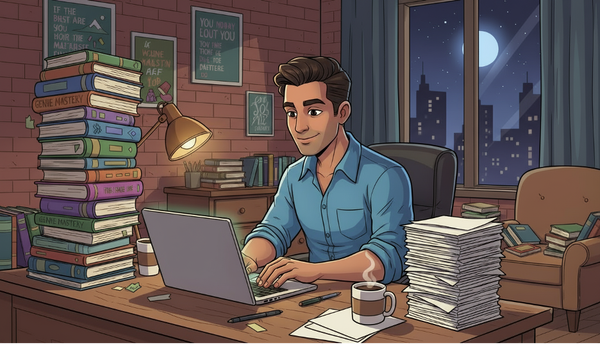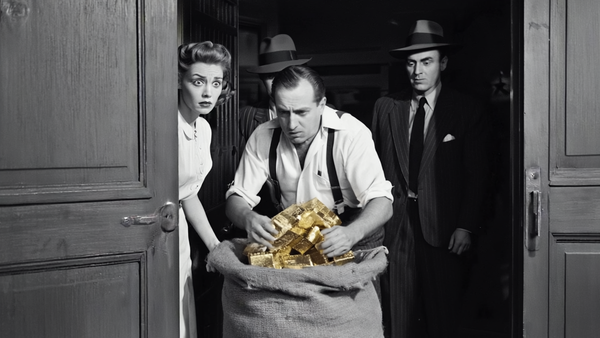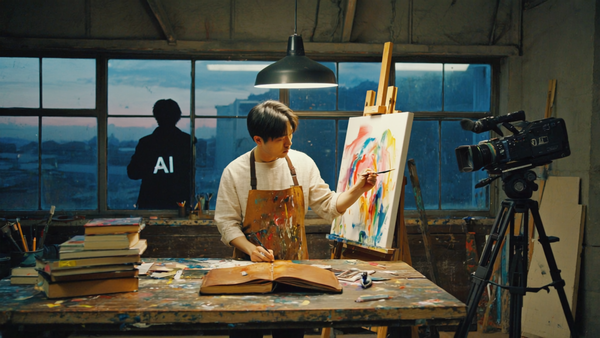The Fear of Failure, The Suspense of Success
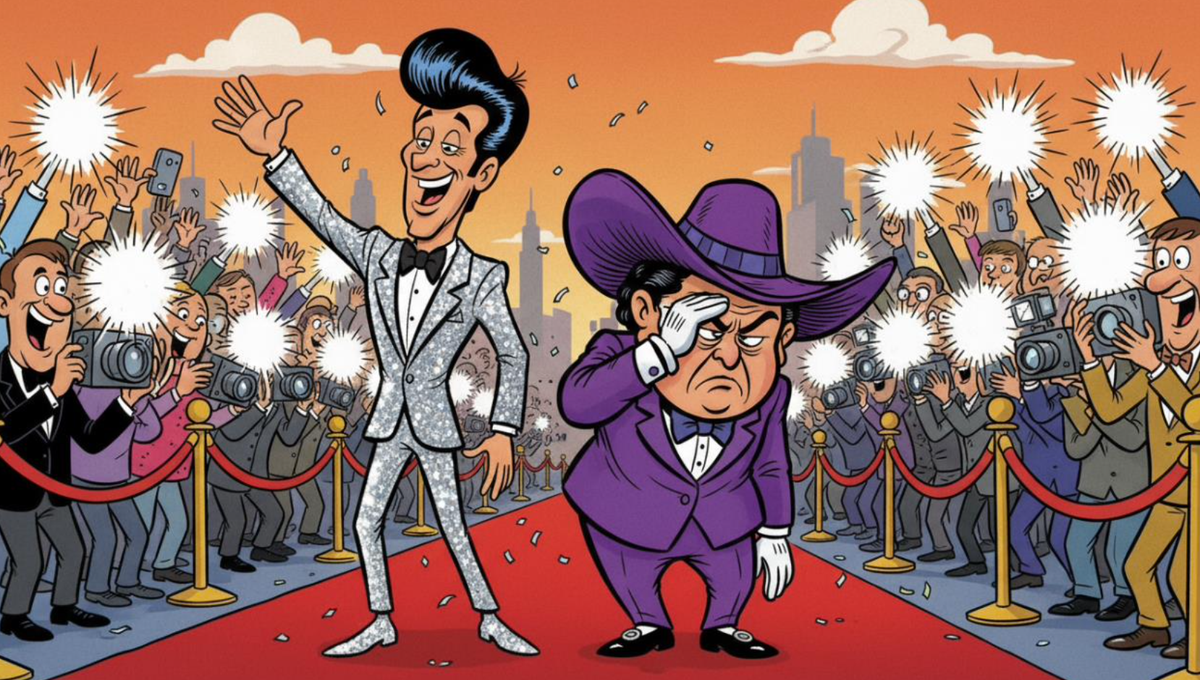
Reflections on Creative Achievements
This essay is dedicated to Anthony Burgess, Stanley Kubrick, John Candy, John Challis, Miki Matsubara, Doug Fieger, and Bruce Gary.
INTRODUCTION
The fear of failure often demotivates aspiring creative professionals. Many artists will never share their art because they worry about what others will say – or not say. Oscar Wilde wrote in The Picture of Dorian Gray, “The only thing worse than being talked about is not being talked about.”
But there are also artists who are cautious about their ambitions, not because they fear failure; rather, they can’t stand the suspense of success.
Professional success can sometimes be a burden – though many of us hesitate to admit it, for fear of seeming ungrateful. But it's important to understand what we want out of life before deciding how ambitious to be.
Steve Jobs was happy to be the face of Apple, while Steve Wozniak was passionate about engineering and didn’t care to be in charge or deliver a series of keynote speeches. He still has a public profile but lacks the mystique that Jobs possessed – and it seems he prefers it that way.
There are trade-offs to success. Steve Jobs didn’t always have the best relationship with his family because of his commitments to Apple.
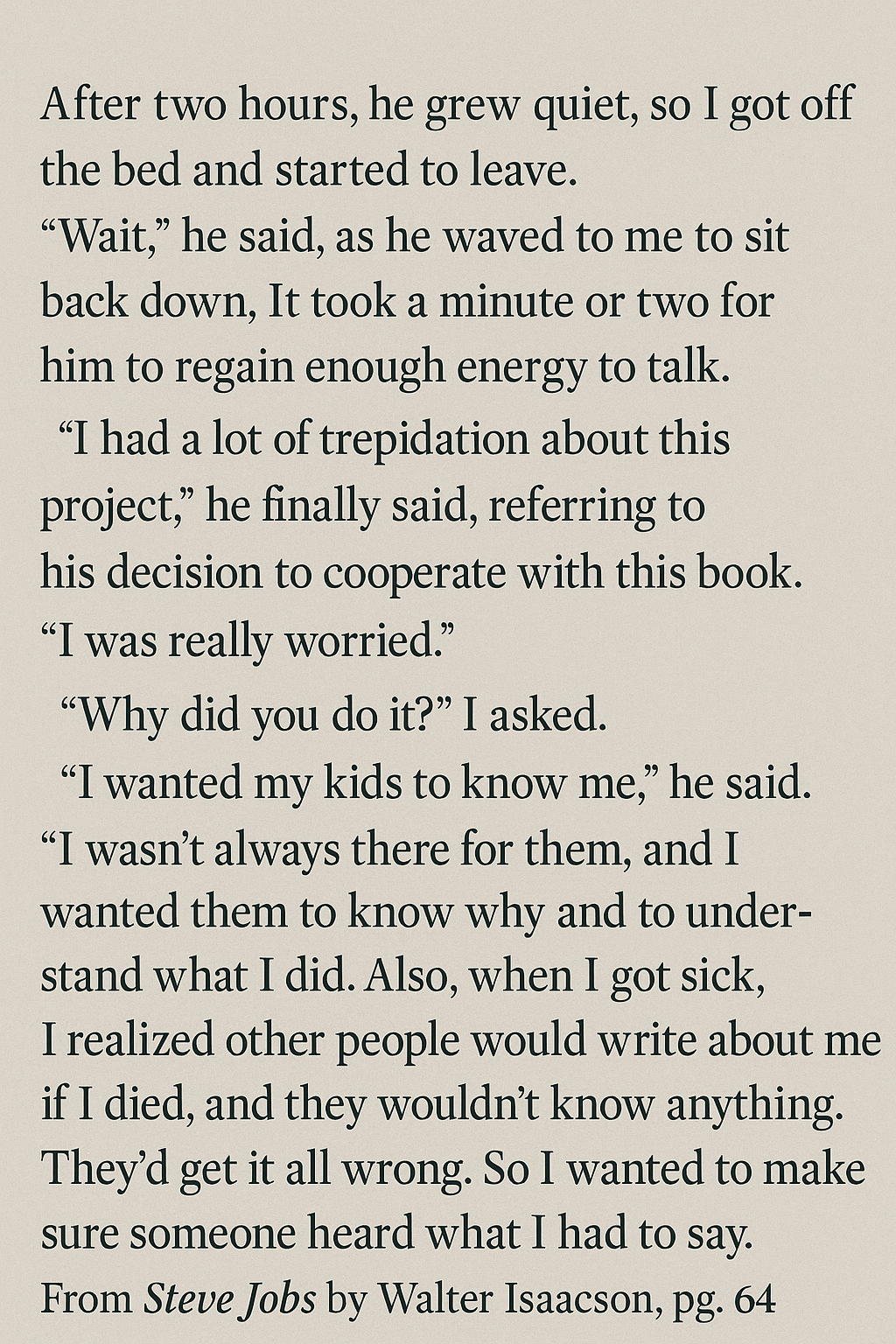
Today, we are more aware of the cost of success. Increasingly, creative professionals will decide how ambitious they want to be. They will determine whether their careers are the most important part of their lives. They will consider how much of a public profile they want to have – if any at all.
Both Stephen Fry and Hugh Laurie are public figures who give interviews. However, Fry clearly enjoys being more in the spotlight, sharing his thoughts, and talking about his career.
No matter how successful the film One Battle After Another is, it’s unlikely that Thomas Pynchon, the author of Vineland, which the film is based on, will emerge from the reclusive life he has maintained for most of his career.
While we might feel shy, immodest, and maybe narcissistic if we daydreamed about what would happen if we “made it,” it’s something aspiring creatives should think about as they chase their careers. What matters most to you – and how will you handle success?
JOHN CANDY
I recently watched the brilliant documentary John Candy: I Like Me about the actor’s incredible life and career, as well as his untimely death and legacy.
What surprised me most about Candy’s life was how he sometimes felt insecure about his career and talents. It’s true that show business is tough. Even with a series of hit films like John Candy’s, an actor is only as good as their latest release. He often felt pressure and anxiety to work consistently and make good films – as he did have a few flops and sometimes received harsh reviews from critics.[1]
Nevertheless, his big-hearted nature never faded. Watching the documentary made me realize that he closely resembled the characters he portrayed—whether it was Del Griffith, Uncle Buck, or Gus Polinski—he was kind to everyone and genuinely decent. After becoming a father, he often turned down roles because they required him to travel and spend a lot of time away from his wife and kids.
At the height of his career, he donated a substantial amount of money to a hospital and preferred to remain anonymous about his donation.
Overall, he seemed at ease with his fame and was the kind of celebrity who always signed autographs. When talking to his fans, he made them feel as if they were the stars! But he also lived on a large farm away from Hollywood's glitz – where he could find peace with his family.
No doubt his fame and the lovable characters he played are what kept his career going. He sadly passed away from a heart attack while filming Wagon’s East in Mexico. His funeral was broadcast across Canada.
Over 30 years after his death, this wonderful documentary about his life was released. While he had a few flops, we remember his hits, his memorable characters, and his public persona.
On one hand, John Candy experienced some of the negative aspects of fame. He faced a few harsh critics who mocked his work. There were constant rude comments about his weight. The pressure affected his health and contributed to his death at age 43 – he would have been 74 as of the initial publication of this essay.
The pressure Candy faced after gaining fame is not something many of us would want or be able to handle. He was definitely grateful, though, because he loved acting and was happy that his performances brought so much joy to others.
When pursuing a career that involves being constantly in front of a camera and in the public eye, one must decide if the pressure and fame are worth the applause from the audience. As a fan, I am forever grateful that John Candy stopped his job to study acting and pursue it as a profession.
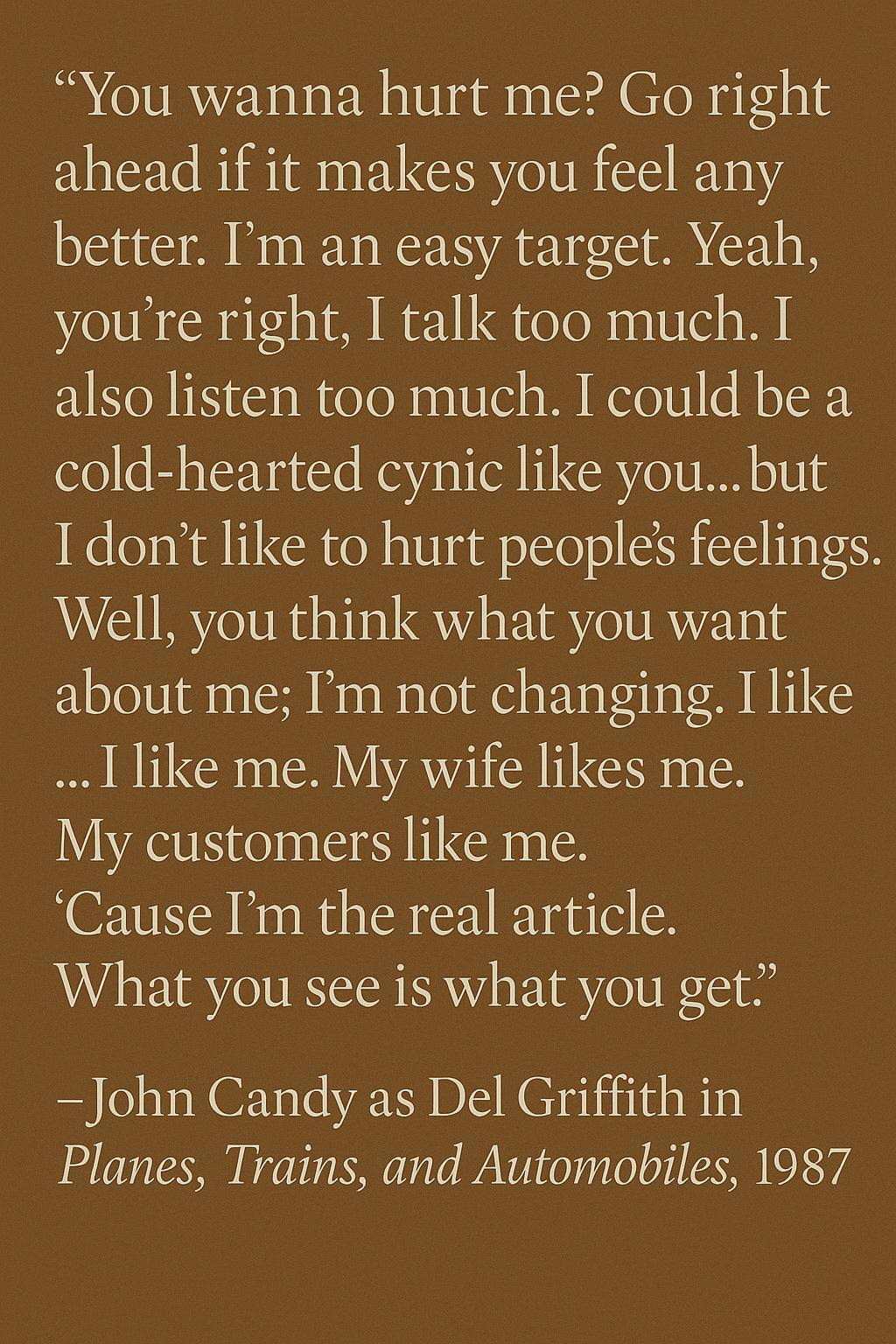
JOHN CHALLIS
Some actors get typecast in roles or are only known for one role – and they hate it. Even if the role or roles have given them recognition, money, or consistent work, they’re often upset that audiences don’t appreciate the breadth of their work.
After receiving acclaim for his role as the attorney Dan Fielding in the hit show Night Court, actor John Larroquette received many offers to do similar roles. Jon Hamm received offer after offer to act in roles that mirrored his character Don Draper in Mad Men.[2] [3]
Some actors, particularly child actors, aren’t able to grow out of the role that made them famous. Producers are hesitant to cast them in unique roles, fearing that audiences won’t accept the actor because they’ll always see the character.
Many child actors, especially, often don’t want to pursue acting once they become adults. Peter Robbins was the first actor to voice Charlie Brown in the Peanuts animated series. He loved the character and even got a tattoo of him along with a Snoopy tattoo. But he mostly retired from acting in his teens and switched to working in the real estate industry.
Danny Lloyd played the role of Danny Torrance in the film The Shining and only had one more role after that in a television film titled Will: G. Gordon Liddy. He didn’t pursue acting as an adult. [4]
Some actors will live to regret the role or roles that made them famous. They find themselves in a dilemma. On one hand, these roles brought fame and success; on the other hand, they prevented them from reaching their full creative potential. This shows how success can sometimes feel like a curse for certain individuals. However, some actors know how to embrace the success of a single character.
One such actor was John Challis, who portrayed Boycie in the now-classic British sitcom Only Fools and Horses.
Challis began his career as an estate agent but dreamt of being an actor – a dream he’d had since his childhood. He’d always been involved in school plays and studied acting formally as well.
He started acting on television in his twenties, but only had small roles here and there. Interestingly, he chose to take a break from acting and began a garden center business. The short-lived sitcom Bloomers was based on his experience as a former actor who owns a garden center.
Although John Challis’s life inspired it, he wasn’t famous enough to be cast in the show. The lead role, based on Challis, went to Richard Beckinsale—one of the most popular actors of his time. Beckinsale died suddenly of a heart attack, and the show was put on hold—though its five episodes were eventually aired.
John Challis eventually returned to acting and met writer John Sullivan, as he played a role in one episode of Sullivan’s sitcom Citizen Smith. John Sullivan was clearly impressed with John Challis and wanted to work with him again.
John Sullivan created the character Boycie for John Challis in his new sitcom Only Fools and Horses, which premiered in 1981. Boycie made his debut in the second episode, first broadcast on September 15, 1981, when Challis was 39 years old.
And the rest was history.
John Challis finally received the recognition he deserved at age 39. Boycie became his most famous role, although he maintained a steady acting career until his death in 2021. His last role was a cameo as Boycie in the Serbian comedy series Državni posao.
Only Fools and Horses was one of the most popular foreign shows in the former Yugoslavia and remains loved by people all over Serbia today. The character Boycie, in particular, connected with many Serbs, and John Challis traveled around Belgrade to learn about the show’s popularity in the country. This became the basis for the documentary, Boycie in Belgrade.
I was living in Belgrade when John Challis was interviewed on Serbian television to talk about his declining health. He died on September 17, 2021, at age 79. This was two days after the 40th anniversary of Boycie’s first TV appearance.
People truly felt sad after his passing, as Boycie was as much a part of Serbian and Yugoslavian culture as he was of British culture. I was once watching an episode of Only Fools and Horses while my housekeeper, Gordana, was cleaning. She mentioned that the show was her favorite growing up and that she absolutely loved Boycie.
This was in 2024. John Challis is no longer with us, sadly, but Boycie will live on forever. He embraced the role that made him a star. He had played many roles, but he didn’t mind being known as Boycie. So much so that he named his autobiography, Being Boycie.
That’s how you handle and celebrate your creative success.

DISAPPOINTMENT AND CONTENTMENT
Once you publish your work, does it still belong to you, or does it belong to the public? In terms of copyright, it’s of course yours. But once it reaches an audience, they determine its fate.
Creating something that positively impacts an audience is a dream for creative professionals. However, sometimes you end up making something you dislike, but the audience loves.
That’s what happened to Woody Allen with the release of his film Manhattan. The film is widely considered one of his best works by both fans and critics alike. Yet he wasn’t happy with the film, to the point that he wanted to halt its release.
He’s enjoyed many of his films but has even said he doesn’t care if they exist after his death. For Allen, the process of creating is more important than the final product, which is true for many creative professionals. The fact that Manhattan was loved by so many did not change Allen’s disappointment in how the film turned out.
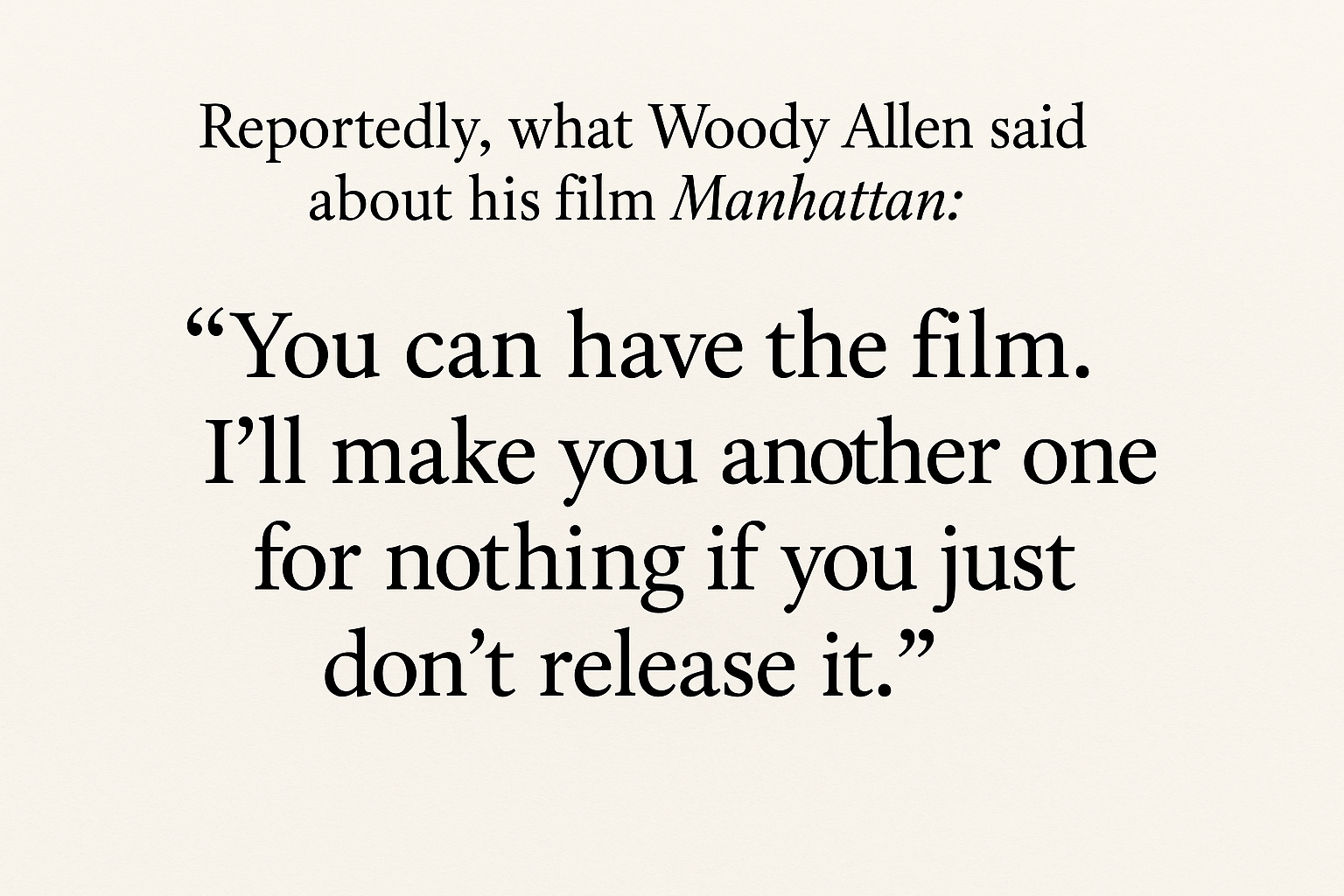
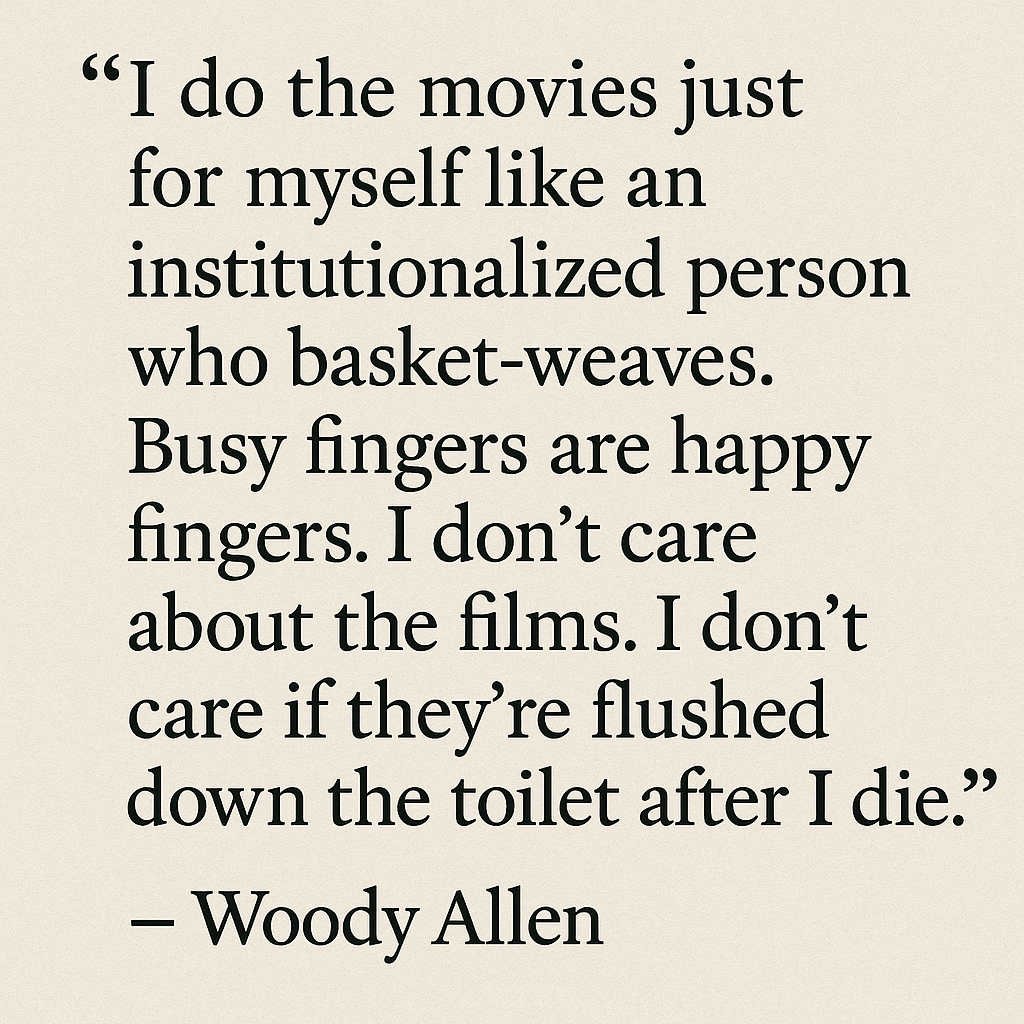
Sometimes, your work won’t just disappoint you but will haunt you. This is what happened to Anthony Burgess with his novel A Clockwork Orange, especially after the release of the film adaptation directed by Stanley Kubrick.
He had written several novels, plays, screenplays, and musical compositions. However, it was A Clockwork Orange that ultimately defined his career, especially after the film's popularity and controversy. He regarded it as a lesser work and was also upset about the impact it had on society.
While both the novel and the film aimed to highlight the horrors of violence, they were also linked to inspiring acts of violence. Kubrick was also upset about the impact his film had—going as far as requesting to stop screenings of it. He even sued a venue that showed the film. [5]
Most creative professionals aim to produce work that appeals to a large audience. However, they should sometimes be cautious about what they wish for. This was the feeling Burgess and Kubrick had regarding A Clockwork Orange. Burgess didn’t believe the novel was his best work, but it was the negative influence on society that troubled him.
We don’t know what Kubrick thought of his film adaptation as art, but he was also troubled by its influence. Whether it was a great film didn’t matter to him. It wasn’t re-released in the UK until after he died in 1999.
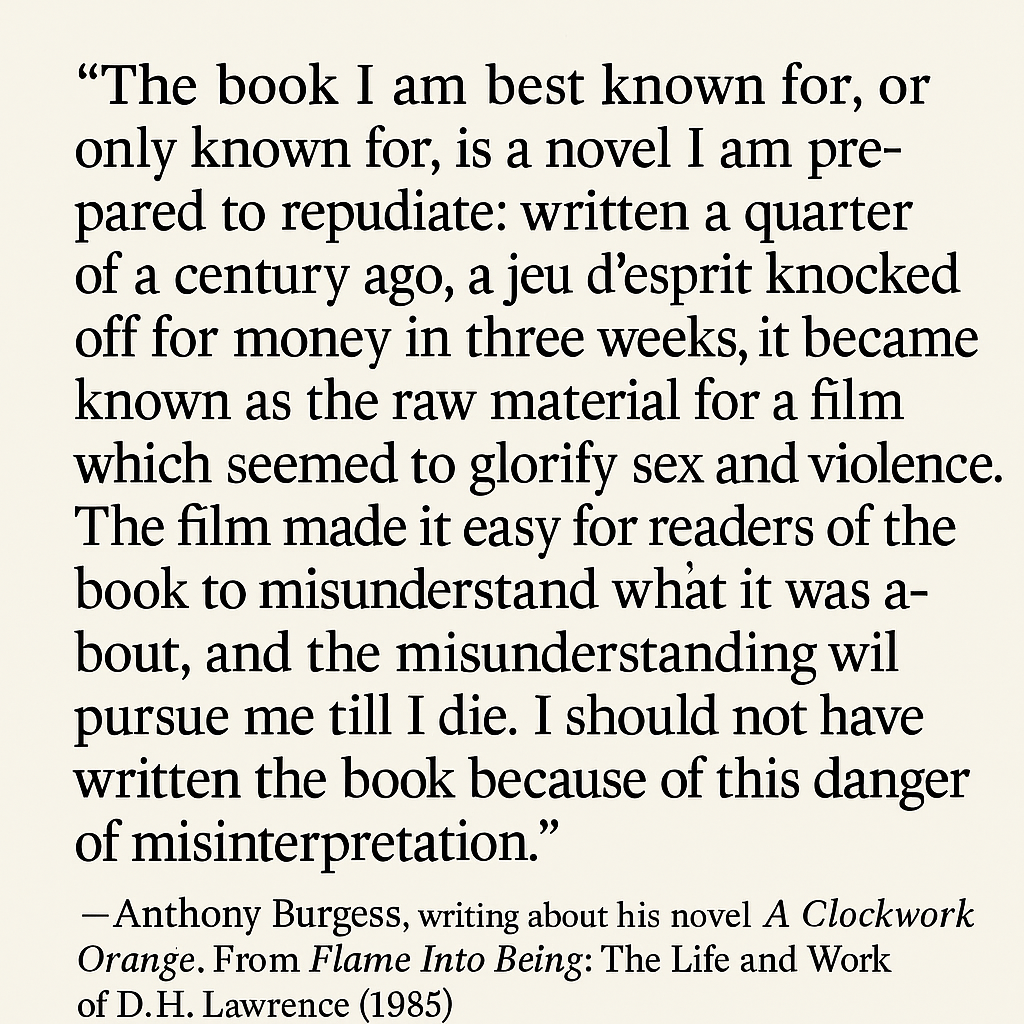
If a creative professional doesn’t make a significant impact with their work or gain recognition, they may feel like they’ve failed. The disappointment becomes overwhelming. But in such moments, it's important to reflect on what truly matters in life—what you really want. Is fame and creating art the most vital aspect of being a creative? Or is it simply working and earning everything we desire?
This conflict is depicted beautifully in the Hindi film Luck by Chance. The story centers on two aspiring actors, Vikram and Sona, who dream of succeeding in Mumbai’s film industry – the largest in the world.
As Vikram lands the lead role in a major film, he begins to compromise his ethics to succeed. Later, it’s questioned whether he ever truly had ethics, as Sona claims he’s inherently selfish.
He doesn’t get along with the lead actress of his film. Still, they spend time together doing photoshoots to promote their upcoming movie. He meets his film idol, Shahrukh Khan, at a restaurant, then leaves his friends behind—he doesn’t want them to hang around while he interacts with the superstar. In fact, Shahrukh Khan warns Vikram that he shouldn’t forget the people who supported him when he was a nobody.
Vikram becomes a film star, while Sona stays a working actress. However, she realizes that she’s happy with her life. She is the first independent woman in her family and did not become selfish to succeed.
She isn’t a celebrity, but she can make a living doing what she loves—something most of us consider a luxury. Her face isn’t on a billboard, but as she sits in the back of a taxi, we see that she is happy and at peace with herself.
Sona, not Vikram, is living the dream of a creative professional.
MIKI MATSUBARA
Social media has a strange way of not only showing us what’s happening now and what the future might hold but also revisiting the past. The past, when we didn’t have social media, is now relived through these platforms!
It was through TikTok that a Japanese pop song from the 1970s went viral and attracted a new generation of fans. I found this song on YouTube myself, as it was recommended by the algorithm, which clearly has good musical taste.
Miki Matsubara released her debut single “Mayonaka no Door (Stay with Me)” on November 5, 1979. This was one of the early examples of the “city pop” genre in Japan, which was influenced by Western music and combined with Japanese style. While the lyrics are in Japanese, except for the English phrase “stay with me” in the chorus, great music crosses language barriers.
The revival of this song and Miki Matsubara’s career naturally reignited interest in her life and work. Reflecting on her life, people can feel happiness when listening to her music, but also sadness about her final days.
Miki Matsubara died on October 7, 2004, sixteen years before her debut song experienced a resurgence thanks to TikTok. One can only wonder how she would have reacted knowing how many more fans she gained through social media and her very first song.
She was only 44 when she died. She died due to complications from cancer.[6]
Reportedly, she regretted her music career, even going so far as to destroy her sheet music and records. She felt that her dedication to music took time away from her family and friends and impacted her health.
The cancer that caused her untimely death has been linked to the pressures a successful artist must endure.
Miki Matsubara is an example of an artist who became resentful of her success. Her success was a blessing for her fans but a curse for her.
You can’t blame her at all—while she made music and had a successful career, it seriously affected her health, and she died far too young. She had to sacrifice time with her loved ones to entertain her fans.

Many of our favorite artists lead sad lives. They give us joy through their art, even while they suffer. Sometimes quietly, sometimes openly. Michael Jackson was happiest when making music, but from childhood to adulthood, he faced the pressures of fame and was hit with one controversy after another.
You might envy your favorite celebrities' success and wealth. But do you envy their celebrity status? Is the constant public scrutiny and the paparazzi's predatory behavior worth it?
It causes us to question whether we truly want to pursue our art. And if we do, is it the most important thing in our lives? Maybe not. Do we genuinely want to give up our privacy for greater success? Or are we willing to accept less success if it means more freedom?
There are lessons to learn from Miki Matsubara’s life and career. We feel sad that it ended so early and that she reportedly regretted her music career. But we can’t help but feel grateful – and we hope that the admiration from her fans brought her comfort in her final days.
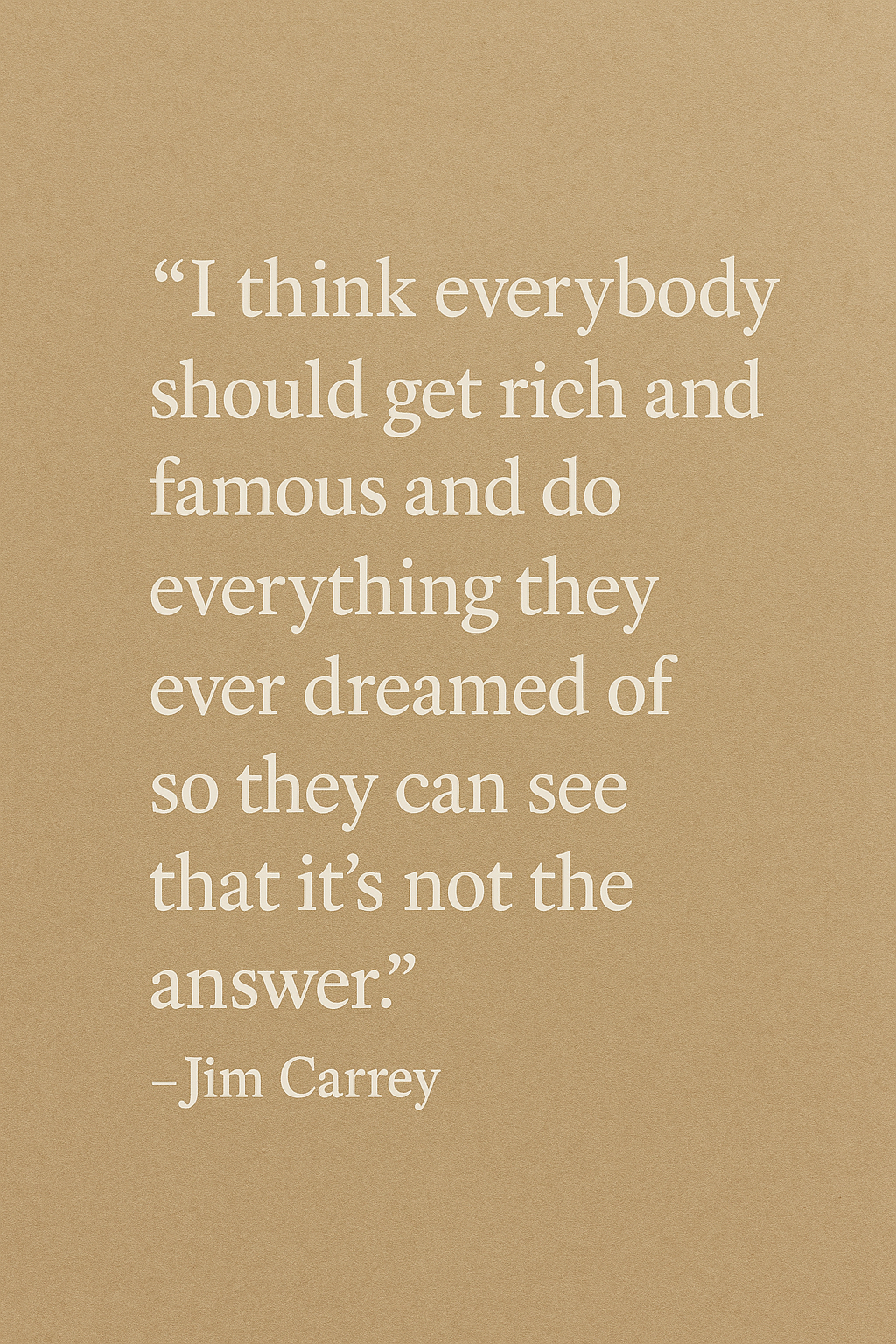
RICK MORANIS
The 1980s was a Golden Age for comedy performers, including the aforementioned John Candy and John Challis. Just as John Candy was a great Canadian performer who thrived in his home country and in the United States, there was another actor and writer who made waves in the ‘80s and ‘90s.
Rick Moranis started his career as a radio DJ in the 1970s. His big break on TV came with Second City Television, which is also where John Candy got his start. The two later reunited to act in Mel Brooks’ now classic comedy Spaceballs.
Rick Moranis was praised for his comedic performances, writing, and impressions. His talents led to a successful Hollywood career. He gave us the iconic Louis Tully in Ghostbusters and Ghostbusters II. He starred in the 1980s remake of Little Shop of Horrors.
He played Wayne Szalinski in Honey, I Shrunk the Kids and its sequels and spinoffs that extended into the ‘90s. He also showed his ability to handle drama when he played an ambitious father as part of the ensemble cast of Parenthood.
Twice, he portrayed a character named Barney in movies I’ve loved since childhood. First, as Barney Coopersmith in My Blue Heaven alongside Steve Martin, and second, as Barney Rubble in The Flintstones with John Goodman.
And of course, the brilliant Dark Helmet in Spaceballs.
He delivered hit after hit and gave us some of the greatest characters in American film comedy history.
And then, in 1997, when he was in his mid-forties, he decided to take a break. His wife Ann Belsky had died of cancer in 1991, leaving him to raise his children alone.
During his wife’s illness, he often had to decline roles to care for her. In the late ‘90s, a few of his films flopped. The last sequel to Honey, I Shrunk the Kids was Honey, We Shrunk Ourselves, which was released straight to video.
He has appeared in only a few films since then, most notably voicing Rutt the moose in the 2003 animated film Brother Bear. He reprised the role in the 2006 direct-to-video sequel.
He declined an opportunity to make a cameo as Louis Tully in the 2016 reboot of Ghostbusters. He is scheduled to appear in a new sequel to Honey, I Shrunk the Kids titled Shrunk. He’s also set to reprise the role of Dark Helmet in Spaceballs 2, which is currently planned for release in 2027. [7][8]
Rick Moranis made a noble choice. It demonstrates that his character is greater than any role he could have played in movies or TV. He had a successful career but decided to take time off to raise his children.
Doing so is risky; an audience might forget an artist's greatness and move on. The artist might not be able to make a comeback. But Rick Moranis didn’t care. His family mattered more than his career.
He made the right decision. His talent is so impressive that his fans continue to adore him. There is no doubt that excitement is building for his return in Shrunk and Spaceballs 2.
I believe both films will succeed mainly because fans want to see him again. I also think he will attract new fans. I, for one, can’t wait.
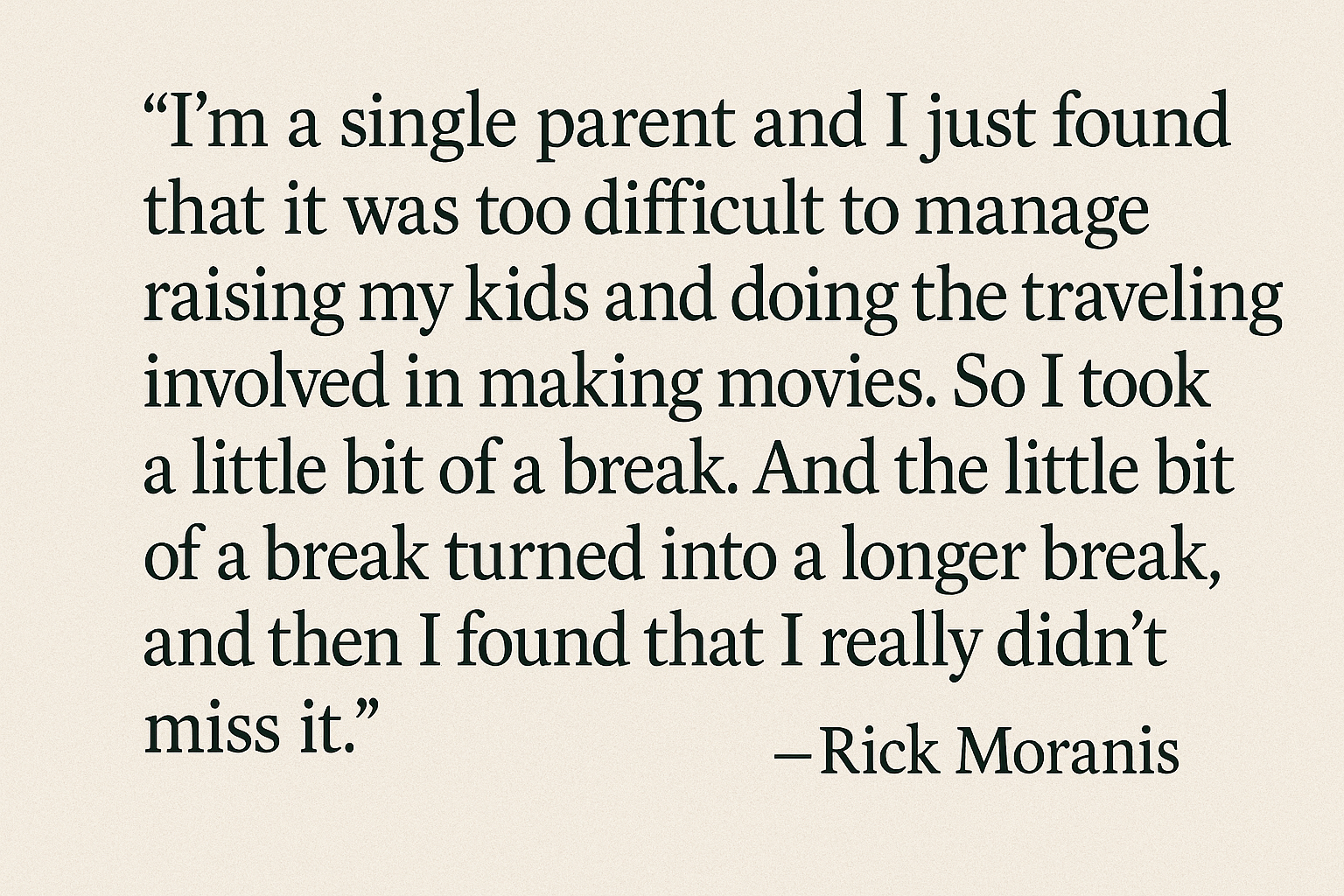
MY SHARONA
What happens when you have a body of work but are only known for one project? Do you embrace being a “one-hit wonder” or resent that your entire career is defined by just that one project?
John Challis embraced his identity as Boycie. Alec Guinness later regretted playing Obi-Wan Kenobi, feeling that the role overshadowed his wide range of work and versatility, for which he was otherwise recognized. He didn’t care for Star Wars at all and reportedly only took the role for the money.[9]
In the late 1970s, Doug Fieger met Sharona Alperin, and the two eventually dated and stayed friends even after their breakup. His relationship with Sharona inspired him to write, along with Berton Averre, an upbeat love song.
The love song released in 1979 was called “My Sharona.” Almost 50 years later, it’s probably one of the most famous one-hit wonders of all time. The song was recorded by The Knack, the band started by Averre, Fieger, along with Prescott Niles and Bruce Gary. The band disbanded and reunited several times during their career, with their final album released in 2012.
But it’s “My Sharona,” their debut song that they are best known for. And it seems they embraced this hit. Perhaps it’s because the song wasn’t just catchy, but it also reflected how Doug Fieger felt about his Sharona. There was genuine emotion behind creating the song, and it became a huge hit.
In other words, we all appreciated the love he had for Sharona.
This is an artist’s dream. Even now, we feel the passion when reciting “Shall I compare thee to a summer’s day?” as written by Shakespeare. When you create a work fueled by pure passion and it becomes a commercial hit, you’ve achieved success as an artist.
The Knack received a $100,000 advance from Capitol Records, which was a debt they had to settle before earning royalties. “My Sharona” was such a huge hit that they paid back the advance and began collecting royalties, including earnings from live performances of the song.
Since Averre and Fieger were the songwriters, they would receive additional royalties from the song. This is called "mechanical royalties," and Averre mentioned that his first mechanical royalty check was “about $90,000.”
While the royalties decreased in the 1980s because the song’s popularity waned, it had a comeback in the 1990s when it was featured in the soundtrack for the film Reality Bites. It’s been included in other movies and commercials, which led to Averre and Fieger receiving synchronization royalties.
Doug Fieger received royalties from the song until his death in 2010. Berton Averre has stated that he still earns royalties from it. [10]
A one-hit wonder that keeps paying repeatedly. This is easily one of the most inspiring creative success stories I’ve ever encountered.
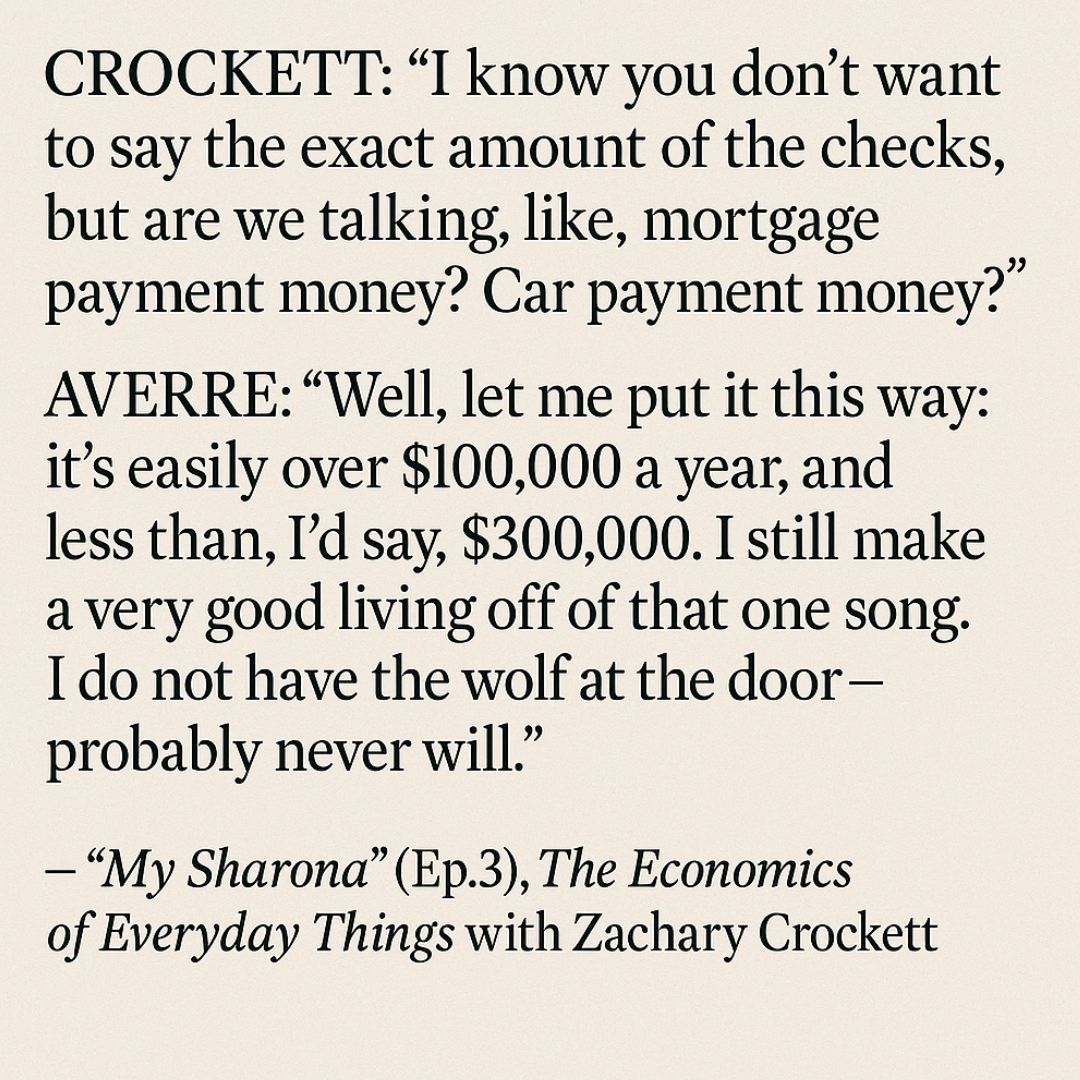
CONCLUSION
Being able to make a living through your creativity is a luxury that most people will never get the chance to experience.
We often dream of building a successful career where each project gains praise and profit. But we might end up as one-hit wonders. Or we might not receive recognition but still maintain a steady career.
There may be times when we need to reevaluate our goals. Is pursuing a creative career worth sacrificing our privacy and peace of mind? Is a creative career worth spending less time with family and friends—and possibly risking our health?
I believe we must always remember that, although art is important, it is not everything.
Our loved ones always come first.
If you can find contentment in your career and leave if necessary, then you have achieved success.
This essay (excluding quotes) is Copyright 2025 Raghav Suri. All Rights Reserved.
Find more works by Raghav Suri at RaghavSuri.com
[1] Hanks, Colin, director. John Candy: I Like Me. Amazon MGM Studios / Maximum Effort, 2025.
[2] Rabin, Nathan. “John Larroquette.” The A.V. Club, 5 June 2008, archived at Web Archive, 19 Dec. 2009, web.archive.org/web/20091219164545/http://www.avclub.com:80/articles/john-larroquette,2331/
[3] Brooks, Xan. “Mad Men’s Jon Hamm Is the Talk of The Town.” The Guardian, 9 Sept. 2010, www.theguardian.com/film/2010/sep/09/jon-hamm-the-town
[4] Eric Volmers, “Shine on: The Shining’s Danny Lloyd Starred in One of the Most Iconic Horror Films of All Time Before Settling into a Quiet, Normal Life,” Calgary Herald, 21 June 2019, www.calgaryherald.com/entertainment/movies/shine-on-the-shinings-danny-lloyd-starred-in-one-of-the-most-iconic-horror-films-of-all-time-before-settling-into-a-quiet-normal-life
[5] Marshall, Colin. “When Stanley Kubrick Banned His Own Film, A Clockwork Orange: It Was the ‘Most Effective Censorship of a Film in British History’.” Open Culture, 19 June 2019, www.openculture.com/2019/06/when-stanley-kubrick-banned-a-clockwork-orange.html
[6] “Miki Matsubara – The Timeless Queen of City Pop.” Yokogao Magazine, 11 Oct. 2025, www.yokogaomag.com/editorial/miki-matsubara-city-pop
[7] Hogan, Kate. “Rick Moranis Is 71! Inside His Quiet Life Since Leaving Hollywood 28 Years Ago.” People, 18 Apr. 2024, www.people.com/rick-moranis-is-71-inside-his-quiet-life-since-leaving-hollywood-8635653
[8] McArdle, Tommy. “Rick Moranis Confirmed to Make His Return to Acting in Spaceballs Sequel After a 28-Year Hiatus.” People, 25 Sept. 2025, www.people.com/rick-moranis-confirmed-return-acting-spaceballs-sequel-11817015
[9] Starkey, Arun. “The reason Alec Guinness hated his role on ‘Star Wars’: ‘I regret having embarked on the film’.” Far Out Magazine, 4 May 2025, faroutmagazine.co.uk/the-reason-alec-guinness-hated-his-role-on-star-wars/
[10] Crockett, Zachary. “The Economics of Everyday Things: ‘My Sharona.’” Freakonomics Radio Network, produced by Sarah Lilley, 5 Feb. 2023, https://freakonomics.com/podcast/my-sharona/
